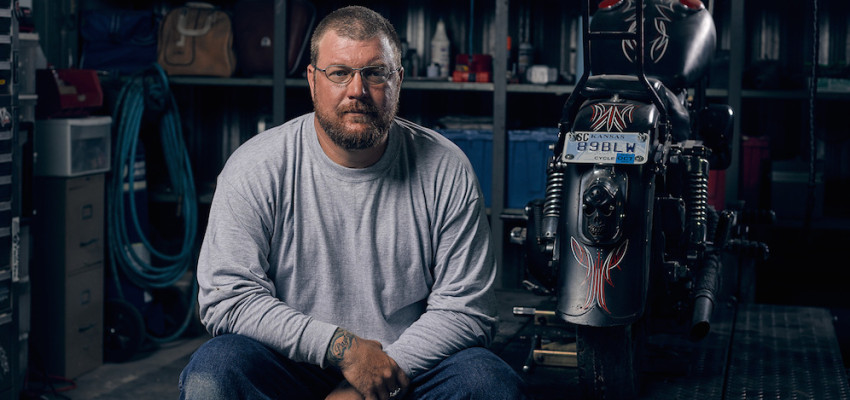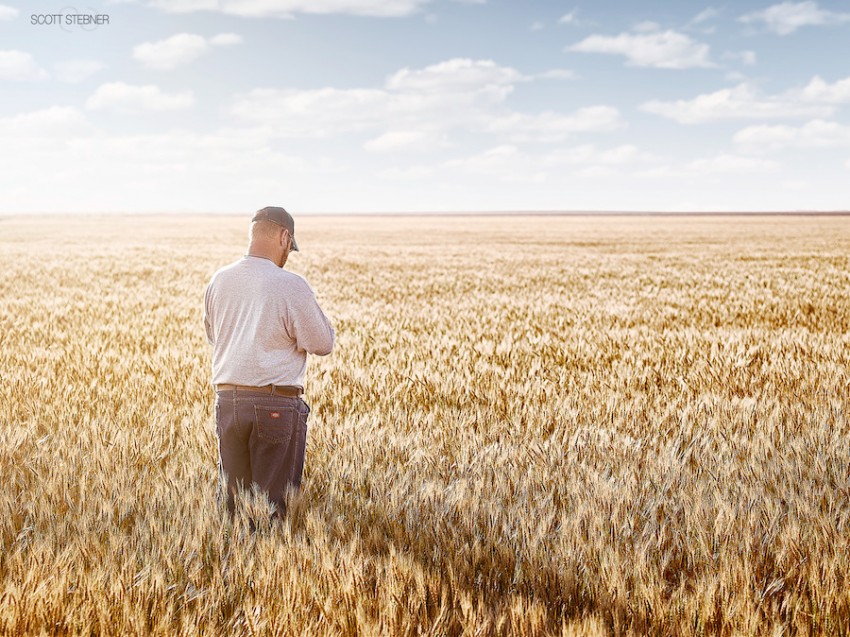By Scott Stebner on July 3, 2015
Wheat and Harleys
The story of an American farmer

After a long night of driving and two hours of sleep in the cheapest motel I’ve ever stayed in, I finally pulled in to Shayne’s driveway. With my camera in hand I opened the car door and expected to be greeted by the quiet of the country. You know, birds chirping, dogs barking, and the gentle sound of wind rustling through golden heads of wheat, that kind of stuff. Instead, a brilliant guitar riff from a classic rock song blasted from the speakers inside a large metal shed. Out walked Shayne.
With long sleeves mostly covering his tattoos, Shayne reached out, shook my hand, and greeted me like an old friend as we walked into his barn. Days away from wheat harvest, I expected to see tractors and combines getting ready to go to work. The barn was definitely full, but not of machinery. A few classic cars were up on lifts and several Harleys were gathered around his toolbox.
Shayne grew up in Western Kansas as a third-generation farmer of wheat and soybeans. As much as he loved the fields of wheat that seemed to stretch forever across the flattened landscape, he always loved the open highways that seemed infinite while on top of his Harley. I try desperately not to get Bon Jovi’s song stuck in my head, but I can’t help but quietly sing, “I’m a cowboy, on a steel horse I ride.”
This brought him out to Southern California to work on classic pieces of Americana…Harley motorcycles. There’s just something so iconic about these machines, so symbolic of America. Harleys bring to mind images of the open road and a commitment to defiantly experience the fly-over states first hand through miles of asphalt and concrete. Although the open road seemed to set his soul free, he knew the roots that sustained him were back with his family in the wheat fields of western Kansas.
 I was here to talk to Shayne about farming. But I soon realized all that I needed to understand about Shayne and farming I could learn through his bike that was up on the lift. He loves that bike, and I get the feeling to call it a machine would be akin to insulting a close friend. Harleys make you want to anthropomorphize them.
I was here to talk to Shayne about farming. But I soon realized all that I needed to understand about Shayne and farming I could learn through his bike that was up on the lift. He loves that bike, and I get the feeling to call it a machine would be akin to insulting a close friend. Harleys make you want to anthropomorphize them.
Anyways, it was obvious Shayne has poured his blood, sweat, and tears into his Harley. You can tell the enormous amount of pride he has for it and the careful attention to detail he has when working on any part of that bike, no matter how big or small. Most of all, he loved it.
Earlier I said I could learn about Shayne the farmer from his love of his Harley. This is where it made sense. Shayne puts that same passion and attention to detail of his motorcycle into the food he grows for his and my children to eat. Everything on that bike is finely tuned to perfection. It’s the same way with his wheat fields.
I have the upmost confidence that if I were to take one of Shayne’s bikes out for a spin, that it would not only keep me safe but also exceed all of my expectations. How do I know? I met him. I’ve seen his craftsmanship and attention to detail. I’ve seen the love he has for his motorcycles and the pride he gets in working on them.
I have that same confidence in the wheat and sorghum he produces. Why? I’ve also seen his craftsmanship and love of the wheat fields. I’ve seen his desire to make every acre of his land better for his children’s generations. But most of all, I’ve seen the pride he has when he’s tending to his fields.
That’s what I learned about Shayne the farmer as we talked about a great symbol of America, the Harley.
And if there’s a more iconic symbol of America than a Harley, it’s the Farmer that also thrives in these fly over states.
This story is part of Scott Stebner's "Kansas Farmer" coffee-table book featuring the folks who grow our food, fuel and fiber. To learn more about the project, go here.

